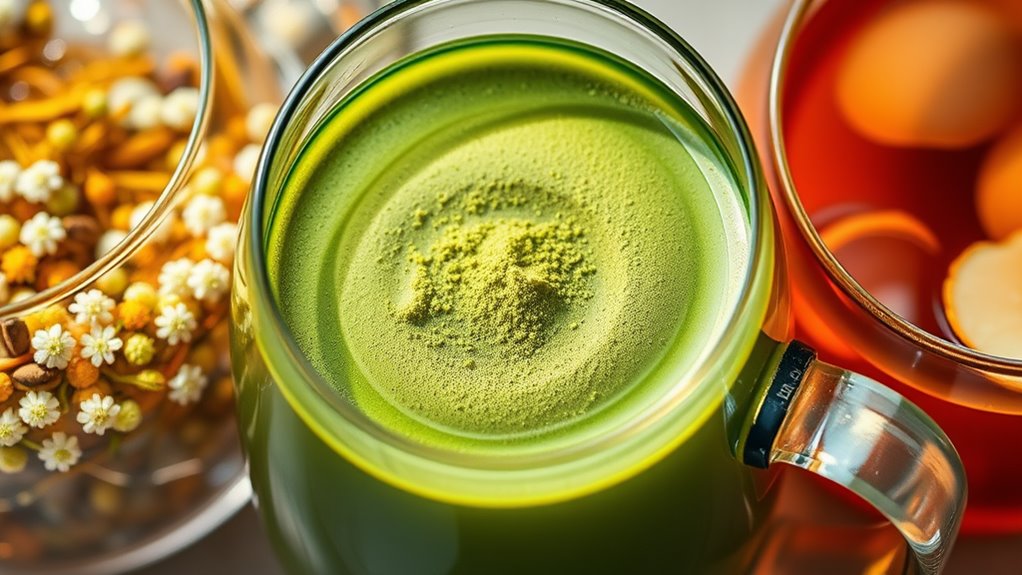These Three Herbal Oils Help My Skin Stay Radiant
Incorporating rosehip, jojoba, and tea tree oils into your skincare routine can significantly enhance your skin’s radiance. Rosehip oil nourishes and promotes a natural glow with its essential fatty acids and antioxidants. Jojoba oil balances oil production while hydrating without causing breakouts. Tea tree oil effectively combats acne and reduces inflammation. Together, these herbal oils address various skin concerns, ensuring a vibrant and healthy complexion. Discover how each can uniquely benefit your skin and elevate your routine.
Key Takeaways
- Rosehip oil nourishes and rejuvenates skin, improving texture and brightness with essential fatty acids and antioxidants.
- Jojoba oil mimics natural skin oils, providing hydration while regulating oil production for a balanced complexion.
- Tea tree oil combats acne and irritation, promoting a clear and even skin tone with its antibacterial properties.
- Regular use of these herbal oils enhances overall skin health, providing moisture and protection against free radicals.
- Incorporating these oils into your routine can lead to a radiant and vibrant complexion over time.
Understanding Herbal Oils for Skin
When it comes to achieving radiant skin, understanding herbal oils can be a game changer. These oils, derived from plants, are packed with nutrients that can enhance your skincare routine.
Essential oils for skincare, like lavender or tea tree, offer unique properties that can target various skin concerns. For instance, lavender oil is known for its calming effects, while tea tree oil is often lauded for its antibacterial qualities. Additionally, incorporating natural oils into your skincare can further support overall skin health and rejuvenation.
It’s crucial to know how to properly dilute these oils before applying them to your skin, as they can be potent. By integrating herbal oils thoughtfully into your routine, you could nurture your skin, promoting a healthier, more vibrant complexion.
Benefits of Using Herbal Oils
While many skincare products promise results, the benefits of using herbal oils stand out due to their natural origins and potent properties. They’re rich in vitamins, antioxidants, and fatty acids, which nourish your skin and promote a healthy glow. Additionally, herbal oils can be tailored to address specific skin concerns, from dryness to acne. Incorporating herbal oils, such as moisturizing properties, into your routine can transform your skin’s health and appearance.
| Benefit | Description | Example Oil |
|---|---|---|
| Hydration | Deeply moisturizes the skin | Jojoba Oil |
| Anti-inflammatory | Reduces redness and irritation | Tea Tree Oil |
| Antioxidant protection | Fights free radicals | Rosehip Oil |
| Soothing | Calms sensitive skin | Lavender Oil |
Overview of the Three Herbal Oils
Herbal oils offer a diverse range of benefits for your skin, making them a valuable addition to any skincare routine. Among the many options available, three stand out for their unique properties: rosehip oil, lavender oil, and jojoba oil.
Each of these oils brings specific advantages to your skin health. Rosehip oil is rich in essential fatty acids and antioxidants, promoting regeneration and hydration. Additionally, incorporating natural face oils into your regimen can significantly enhance the overall health and appearance of your skin.
Lavender oil is renowned for its calming properties and ability to soothe irritation. Jojoba oil closely resembles your skin’s natural oils, making it an excellent moisturizer that balances oil production.
Herbal Oil #1: Rosehip Oil
Among the standout options in the world of herbal oils, rosehip oil is particularly noteworthy for its impressive skin benefits. Extracted from the seeds of the wild rose bush, this oil’s rich composition makes it a favorite among skincare enthusiasts.
It’s packed with essential fatty acids, vitamins, and antioxidants that can nourish your skin deeply. You might find it particularly appealing for its lightweight texture, allowing for easy absorption without leaving an oily residue.
Whether you’re dealing with dryness, uneven texture, or the effects of aging, incorporating rosehip oil into your routine can be a game changer. It’s a versatile oil that suits various skin types, providing a natural, radiant glow that many strive for. Additionally, using natural night oils can enhance your skin’s rejuvenation process, making it an ideal choice for nighttime skincare routines.
Rosehip Oil Benefits for Skin
Rosehip oil is packed with essential nutrients that can significantly enhance your skin’s health.
It not only nourishes but also promotes skin regeneration, helping to restore your natural glow.
If you’re looking for a way to rejuvenate and revitalize your complexion, rosehip oil might just be the solution you need.
Rich in Nutrients
When it comes to nourishing your skin, few oils rival the benefits of rosehip oil, especially due to its rich nutrient profile. Packed with essential fatty acids and vitamins, rosehip oil can work wonders for your complexion.
Here are some key nutrients that contribute to its effectiveness:
- Vitamin A: Promotes cell turnover and helps maintain skin elasticity.
- Vitamin C: A potent antioxidant that brightens the skin and helps reduce dark spots.
- Omega-3 and Omega-6 Fatty Acids: Support skin barrier function and hydration.
- Linoleic Acid: Helps balance oily skin and reduces inflammation.
Incorporating rosehip oil into your skincare routine can be a game changer, providing your skin with the nutrients it craves for a radiant appearance.
Promotes Skin Regeneration
If you’re looking to rejuvenate your skin, rosehip oil is a powerful ally in promoting skin regeneration. This oil is packed with essential fatty acids and antioxidants, which help repair damaged skin and stimulate collagen production.
By incorporating rosehip oil into your skincare routine, you can enhance your skin’s natural ability to heal and renew itself. You’ll likely notice improvements in skin texture and reduction in fine lines and scars over time.
Its lightweight formula absorbs quickly, making it suitable for all skin types. Plus, rosehip oil is rich in vitamins A and C, which support overall skin health.
Using it regularly can leave your complexion looking more vibrant and youthful, bringing out your natural radiance. Embrace the benefits of rosehip oil for a refreshed you!
How to Use Rosehip Oil
Using rosehip oil can be a transformative addition to your skincare routine. This lightweight oil is rich in essential fatty acids and vitamins, making it ideal for nourishing your skin.
Here’s how to incorporate it effectively:
-
Cleanse First: Always start with a clean face to ensure maximum absorption.
-
Apply Directly: Use a few drops of rosehip oil and gently massage it into your skin, focusing on areas that need extra hydration.
-
Mix with Moisturizer: For added benefits, blend a drop or two with your regular moisturizer.
-
Nighttime Routine: Consider applying it at night, allowing your skin to rejuvenate while you sleep.
Herbal Oil #2: Jojoba Oil
Jojoba oil is a fantastic option for keeping your skin hydrated and locking in moisture.
Its unique composition allows it to mimic your skin’s natural oils, helping to balance oil production effectively.
Hydration and Moisture Lock
When it comes to achieving radiant skin, ensuring proper hydration is essential, and that’s where jojoba oil shines. This lightweight oil mimics your skin’s natural sebum, making it an excellent choice for locking in moisture without feeling greasy.
Here’s how jojoba oil can transform your skin hydration routine:
-
Deep absorption: It penetrates the skin easily, providing hydration at deeper layers.
-
Non-comedogenic: It won’t clog your pores, making it suitable for all skin types.
-
Barrier protection: Jojoba oil helps create a protective barrier, preventing moisture loss.
-
Soothing properties: It calms irritation and redness, enhancing your skin’s overall appearance.
Incorporating jojoba oil into your skincare routine can lead to a more hydrated, radiant complexion.
Balancing Skin’s Oil Production
Finding the right balance in your skin’s oil production can be challenging, especially if you’re dealing with excess oil or dryness.
Jojoba oil is an excellent option to consider, as its structure closely resembles the natural sebum your skin produces. This means it can help regulate oil production, making it perfect for those with oily or combination skin.
By applying jojoba oil, you can hydrate your skin without clogging pores or causing breakouts. Additionally, it soothes dryness by providing moisture and promoting a healthy skin barrier.
Just a few drops can make a significant difference, bringing your skin back into balance. Incorporating jojoba oil into your routine might be the key to achieving that radiant complexion you desire.
Jojoba Oil Benefits for Skin
As you explore natural remedies for your skin, you’ll discover that jojoba oil stands out as a versatile and beneficial option. This oil mimics your skin’s natural sebum, making it an excellent moisturizer without clogging pores.
Here are some key benefits of jojoba oil for your skin:
-
Hydration: Provides deep moisture, keeping your skin soft and supple.
-
Balancing: Helps regulate oil production, making it suitable for all skin types.
-
Antioxidant Properties: Rich in vitamins E and B, it protects against free radicals.
-
Soothing: Calms irritation and redness, promoting an even skin tone.
Incorporating jojoba oil into your skincare routine can enhance your natural glow while addressing various skin concerns effectively.
How to Use Jojoba Oil
Using jojoba oil can significantly enhance your skin’s health, thanks to its moisturizing and balancing properties.
To get the most out of this versatile oil, it’s essential to understand the best application tips and techniques.
Benefits for Skin Health
When it comes to nurturing your skin, jojoba oil stands out for its remarkable benefits. This versatile oil closely resembles your skin’s natural sebum, making it an excellent moisturizer.
Here are some key advantages you might appreciate:
- Hydration: Helps retain moisture, preventing dryness and flakiness.
- Balancing: Regulates oil production, making it suitable for both oily and dry skin types.
- Soothing: Reduces inflammation and redness, promoting a more even skin tone.
- Antioxidant properties: Protects against environmental damage and premature aging.
Incorporating jojoba oil into your skincare routine can significantly enhance your skin’s overall health, leaving it looking radiant and rejuvenated.
It’s an easy and effective way to support your skin’s natural beauty.
Application Tips and Techniques
Incorporating jojoba oil into your skincare routine is simple and can be tailored to fit various needs. Start by applying a few drops directly to your clean, damp face to lock in moisture.
You can also mix jojoba oil with your favorite moisturizer or serum for added hydration. If you’re prone to breakouts, use it sparingly as a spot treatment on blemishes, as it mimics your skin’s natural oils.
For a soothing experience, warm a few drops in your palms before gently pressing onto your skin. Remember, a little goes a long way!
Lastly, consider using it as a makeup remover, as it effectively dissolves makeup while nourishing your skin. Enjoy the radiant glow!
Herbal Oil #3: Tea Tree Oil
While many herbal oils boast skin benefits, tea tree oil stands out for its powerful antibacterial and anti-inflammatory properties. You might find it particularly useful if you struggle with blemishes or irritation.
This versatile oil can be easily incorporated into your skincare routine for a variety of purposes.
- Helps combat acne by reducing bacteria on the skin
- Soothes redness and inflammation from skin irritations
- Acts as a natural remedy for dandruff and scalp issues
- Can be diluted in carrier oils for safe topical application
Using tea tree oil can enhance your skin’s overall health, but remember to patch-test first.
With its unique qualities, it’s a valuable addition to your herbal oil collection.
Tea Tree Oil Benefits for Skin
Tea tree oil offers a range of benefits that can significantly enhance your skincare regimen. Known for its antibacterial and anti-inflammatory properties, it effectively combats acne and soothes irritation, making it perfect for blemish-prone skin. It also helps in reducing excess oil, promoting a clearer complexion.
| Benefit | Description |
|---|---|
| Acne Treatment | Reduces acne-causing bacteria and inflammation. |
| Skin Soothing | Calms redness and irritation from breakouts. |
| Oil Control | Regulates oil production for a balanced look. |
| Antimicrobial | Fights off bacteria, preventing future outbreaks. |
Incorporating tea tree oil into your routine can lead to healthier, more radiant skin. Just remember to patch-test to ensure your skin responds well!




